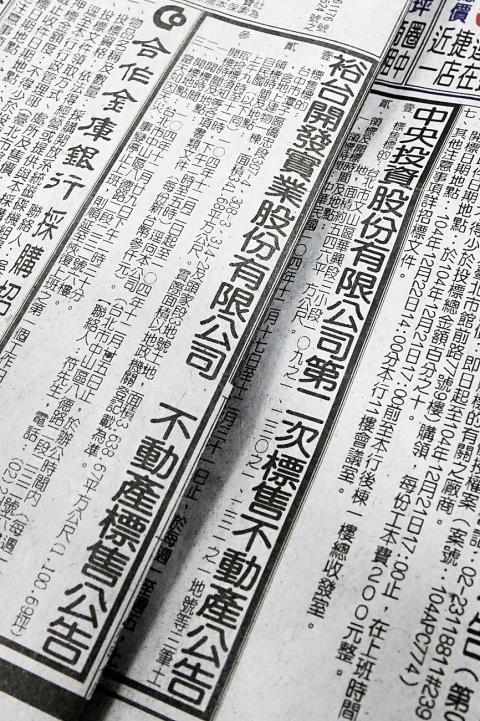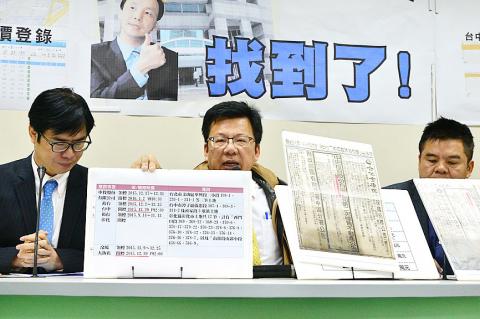The Democratic Progressive Party (DPP) caucus yesterday said that it suspects the Chinese Nationalist Party (KMT) is trying to sell its party assets before an anticipated Presidential Office handover to the DPP next year.
The DPP caucus told a news conference in Taipei that the Chinese-language Commercial Times has been publishing advertisements calling for buyers for 26 plots owned by the KMT — three in Taipei, six in Taichung and 17 in Changhua — and for 80 percent of the shares of a hotel in Palau.
“The contact address for all of these advertisements points to the KMT headquarters on Bade Road in Taipei,” DPP Legislator Lee Chun-yi (李俊俋) said.

Photo: Lu Chun-wei, Taipei Times
Lee questioned whether the KMT is trying to sell out its party assets in different batches in order to avoid possible calls for the recovery of funds following the potential change to the nation’s governing party next year.
DPP Legislator Chuang Ruei-hsiung (莊瑞雄) said that according to the information made available by the land plots’ price registration system, the money that could be amassed by the sale of the plots and the hotel shares could total more than NT$1.4 billion (US$42.27 million).
DPP Legislator Chen Chi-mai (陳其邁) asked whether KMT Chairman Eric Chu (朱立倫) is selling the party assets to raise the funds needed to cover the party’s election expenses, “probably including vote-buying.”

Photo: Wang Yi-sung, Taipei Times
“Chu is the commander-in-chief of land speculation, with his party’s sales of plots of valued land,” Chen said.
Buyers are advised against purchasing these plots at a low price, as they are ill-gotten gains, DPP Legislator Yeh Yi-jin (葉宜津) said.
She also questioned why an affidavit of confidentiality needs to be signed when making bids for the party’s assets, as the party has demanded.
Former DPP spokesperson Hsu Chia-ching (徐佳青) said that she has been collecting information about the asset sales for a while, stressing that she first noticed an advertisement in the Commercial Times last month calling for buyers for a hotel in Palau, and last week noticed plots for sale in Tanzih (潭子), Taichung, and Wenshan (文山), Taipei, “the ads of which were only a day apart.”
“And two months ago I found out that the KMT was selling land in Changhua, totaling about 7,400 ping (2.446 hectares), which had been leased to RT-Mart, but has recently been taken back for sale,” Hsu said.
The contact address for the four ads is the KMT’s central headquarters and the contact number is the KMT’s number with various extensions, she said.
Hsu also pointed out that the KMT has established two foundations recently.
“Compounding the land sales, it makes one wonder what the KMT is up to,” she said.

MAKING WAVES: China’s maritime militia could become a nontraditional threat in war, clogging up shipping lanes to prevent US or Japanese intervention, a report said About 1,900 Chinese ships flying flags of convenience and fishing vessels that participated in China’s military exercises around Taiwan last month and in January last year have been listed for monitoring, Coast Guard Administration (CGA) Deputy Director-General Hsieh Ching-chin (謝慶欽) said yesterday. Following amendments to the Commercial Port Act (商港法) and the Law of Ships (船舶法) last month, the CGA can designate possible berthing areas or deny ports of call for vessels suspected of loitering around areas where undersea cables can be accessed, Oceans Affairs Council Minister Kuan Bi-ling (管碧玲) said. The list of suspected ships, originally 300, had risen to about

DAREDEVIL: Honnold said it had always been a dream of his to climb Taipei 101, while a Netflix producer said the skyscraper was ‘a real icon of this country’ US climber Alex Honnold yesterday took on Taiwan’s tallest building, becoming the first person to scale Taipei 101 without a rope, harness or safety net. Hundreds of spectators gathered at the base of the 101-story skyscraper to watch Honnold, 40, embark on his daredevil feat, which was also broadcast live on Netflix. Dressed in a red T-shirt and yellow custom-made climbing shoes, Honnold swiftly moved up the southeast face of the glass and steel building. At one point, he stepped onto a platform midway up to wave down at fans and onlookers who were taking photos. People watching from inside

Japan’s strategic alliance with the US would collapse if Tokyo were to turn away from a conflict in Taiwan, Japanese Prime Minister Sanae Takaichi said yesterday, but distanced herself from previous comments that suggested a possible military response in such an event. Takaichi expressed her latest views on a nationally broadcast TV program late on Monday, where an opposition party leader criticized her for igniting tensions with China with the earlier remarks. Ties between Japan and China have sunk to the worst level in years after Takaichi said in November that a hypothetical Chinese attack on Taiwan could bring about a Japanese

STREAMLINED: The dedicated funding would allow the US to transfer equipment to Taiwan when needed and order upgraded replacements for stockpiles, a source said The US House of Representatives on Thursday passed a defense appropriations bill totaling US$838.7 billion, of which US$1 billion is to be allocated to reinforcing security cooperation with Taiwan and US$150 million to replace defense articles provided to the nation. These are part of the Consolidated Appropriation Act, which the US House yesterday passed with 341 votes in favor and 88 against. The act must be passed by the US Senate before Friday next week to avoid another government shutdown. The US House Committee on Appropriations on Monday unveiled the act, saying that it allocates US$1 billion for the Taiwan Security Cooperation Initiative